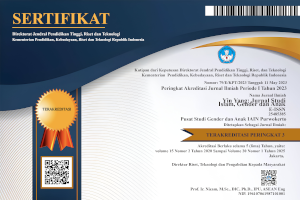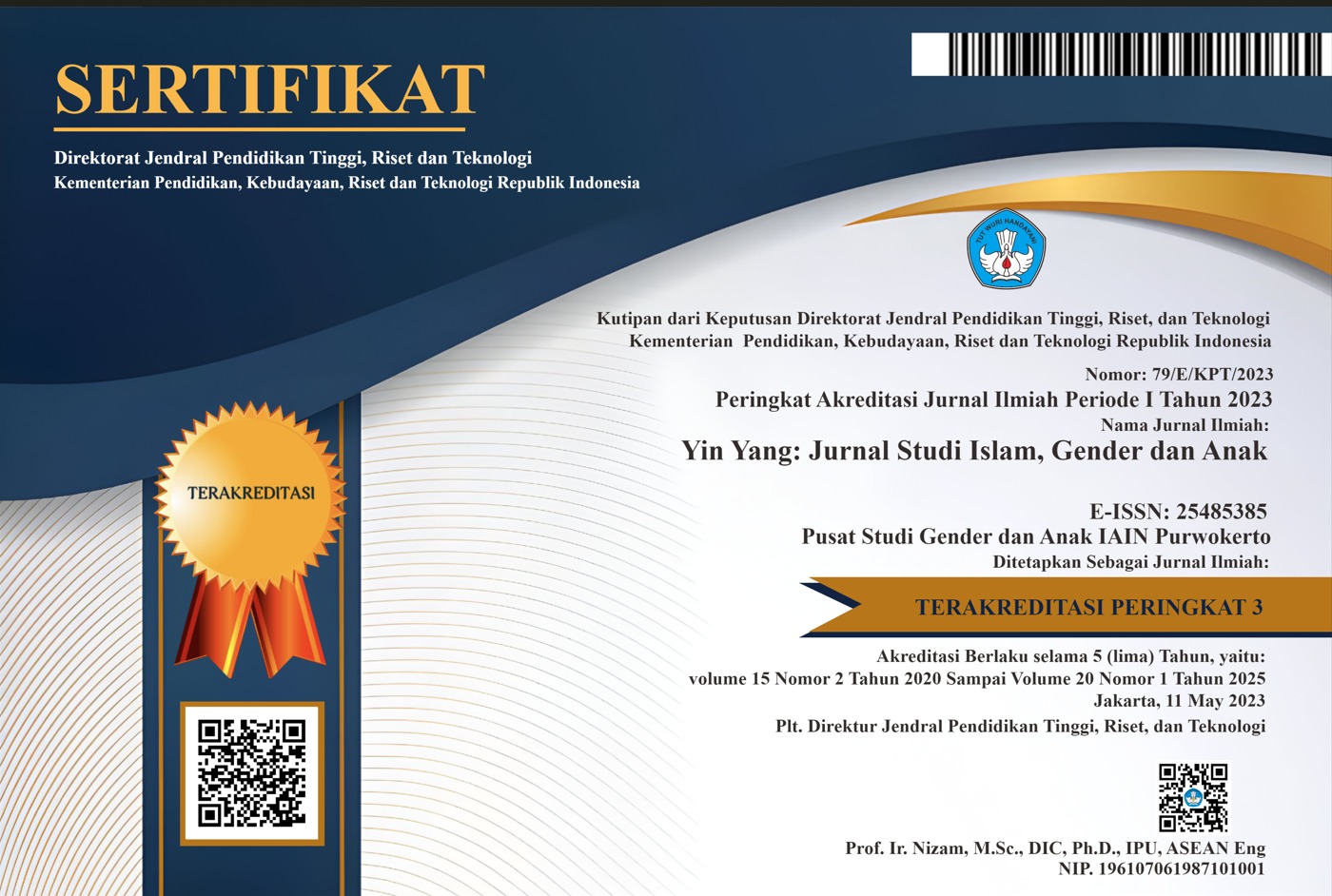Perkembangan Moral Anak Usia Dini Usia 0-6 Tahun dan Stimulasinya
DOI:
https://doi.org/10.24090/yinyang.v16i2.4421Keywords:
Development, Morals, Early ChildhoodAbstract
Early childhood is also a group of children aged 0-6 years. So children at an early age as the golden age (Golde Age) which only happens once in their life. Early childhood is a period of development which is very important for his life. Because during this period of development, all the potential that the child has, needs encouragement that can develop optimally. At this time one of the attitudes that children must have is to be a good and right human being towards their parents, teachers and in the community. Although the main role of parents is to stimulate their development, teachers in schools are also very necessary in laying the foundation for the moral development of early childhood. Therefore, in the development of moral values, it is closely related to the character of children that must become an habituation in their daily life. With the teacher designing more programmed learning activities and learning media that can lead children to moral values, because it is very influential for early childhood playing in designing interesting games as well as fun to develop morein children's moral development. Early childhood is also a group of children aged 0-6 years. So children at an early age as the golden age (Golde Age) which only happens once in their life. Early childhood is a period of development which is very important for his life. Because during this period of development, all the potential that the child has, needs encouragement that can develop optimally. At this time one of the attitudes that children must have is to be a good and right human being towards their parents, teachers and in the community. Although the main role of parents is to stimulate their development, teachers in schools are also very necessary in laying the foundation for the moral development of early childhood. Therefore, in the development of moral values, it is closely related to the character of children that must become an habituation in their daily life. With the teacher designing more programmed learning activities and learning media that can lead children to moral values, because it is very influential for early childhood playing in designing interesting games as well as fun to develop morein children's moral development.Downloads
Download data is not yet available.
References
Ananda, R. (2017). Jurnal Obsesi : Jurnal Pendidikan Anak Usia Dini Implementasi Nilai-nilai Moral dan Agama pada Anak Usia Dini. Jurnal Obsesi.
Aris Priyanto. (2014). Jurnal Ilmiah Guru “COPEâ€, No. 01/Tahun XVIII/Mei 2014. Pengembangan Kreativitas Pada Anak Usia Dini Melalui Aktivitas Bermain.
Ariyanti, T. (2016). Pentingnya Pendidikan Anqk Usia Dini bagi Tumbuh Kembang Anak. PGPAUD Universitas Muhammadiyah Purwokerto.
Berkowitz, M. W., & Fekula, M. J. (1999). Educating for Character . About Campus: Enriching the Student Learning Experience. https://doi.org/10.1177/108648229900400504
Conn, J. H. (1957). Child Development. Elizabeth B. Hurlock . The Quarterly Review of Biology. https://doi.org/10.1086/401862
Dahl, A., & Killen, M. (2018). A developmental perspective on the origins of morality in infancy and early childhood. Frontiers in Psychology. https://doi.org/10.3389/fpsyg.2018.01736
Davood manavipour. (2012). Moral Development Scale. Educational Research and Essay, 1(2), 15–20.
Dewey J. (1997). Experience and Education. Collier Books.
Didik, S. (2015). Perkembangan Nilai Agama Dan Moral Anak. Perkembangan Nilai Agama Dan Moral Anak Dan Pendidikan Keagamaan Orangtua.
Elizabeth B. Hurlock. (1978). Perkembangan Anak Jilid 2. Erlangga.
Essa, E. L. (2014). INTRODUCTION TO EARLY CHILDHOOD EDUCATION, 7th Edition. In Cengage Learning.
Eva latipah, Hanif Cahyo Adi Kistoro, Fitria Fauziah Hasanah, H. P. (2020). Elaborating Motive and Psychological Impact of Sharenting in Millennial Parents. Universal Journal of Educational Research, 8(10), 4807–4817.
Eva Latipah, Hanif Cahyo Adi Kistoro, H. P. (2020). The Effects of Positive Parenting toward Intolerance in Pre-School Children. International Journal of Early Childhood Special Education (INT-JECSE)., 12(2), 137–146.
Fitri, M., & Na’imah, N. (2020). Faktor Yang Mempengaruhi Perkembangan Moral Pada Anak Usia Dini. Al-Athfaal: Jurnal Ilmiah Pendidikan Anak Usia Dini. https://doi.org/10.24042/ajipaud.v3i1.6500
Hasanah E. (2019). Perkembangan Moral Siswa Berdasarkan Teori Kolhlberg. Journal UNY, 6(2), 131–145.
Hasanah, U. (2018). METODE PENGEMBANGAN MORAL DAN DISIPLIN BAGI ANAK USIA DINI. Martabat: Jurnal Perempuan Dan Anak. https://doi.org/10.21274/martabat.2018.2.1.91-116
J.I.G.M.Drost, dkk. (2003). Perilaku Anka Usia Dini. Kanisius.
Juita, R. (2017). PENINGKATAN KEMAMPUAN BERHITUNG ANAK MELALUI PERMAINAN MENAKAR AIR DI TK AISYIYAH KOTO KACIAK MANINJAU. Pesona PAUD.
Loukatari, P., Matsouka, O., Papadimitriou, K., Nani, S., & Grammatikopoulos, V. (2019). The effect of a structured playfulness program on social skills in kindergarten children. International Journal of Instruction. https://doi.org/10.29333/iji.2019.12315a
Maulidya Pasaribu. (2017). Upaya Meningkatkan Perkembangan Moral Anak Melalui Media Audio-Visual DiKelompok B PAUD Ayuni Tembung Kec.Percut Sei Tuan Kab Deli Serdang. Fakultas Ilmu Tarbiyah Dan Keguruan Universitas Islam Negeri.
Megawangi, R. (2010). Pengembangan Program Pendidikan Karakter di Sekolah. Pengalaman Sekolah Karakter.
Nurbayani, N. (2017). Tanggung Jawab Orang Tua Dalam Pembinaan Keimanan Pada Anak Remaja Di Kecamatan Peudada Bireun. Lantanida Journal. https://doi.org/10.22373/lj.v5i1.2059
Oladipo, S. E. (2009). Moral Education of the Child: Whose Responsibility? Journal of Social Sciences. https://doi.org/10.1080/09718923.2009.11892733
Rakihmawati, & Yusmiatinengsih. (2012). Upaya Meningkatkan Perkembangan Moral Anak Usia Dini Melalui Mendongeng Di TK Dharmawanita. VISI : Jurnal Ilmiah Pendidik Dan Tenaga Kependidikan Pendidikan Non Formal.
Sanchez, T., Zam, G., & Lambert, J. (2009). Story-telling as an effective strategy in teaching character education in middle grade social studies. Journal for the Liberal Arts and Sciences.
Setiawati, F. A. (2006). PENDIDIKAN MORAL DAN NILAI-NILAI AGAMA PADA ANAK USIA DINI: BUKAN SEKEDAR RUTINITAS. Paradigma: Jurnal Psikologi Pendidikan Dan Konseling.
Sjarkawi. (2006). Pembentukkan Kepribadian Anak (Pesan Moral, Intelektual, Emosional,dan Sosial Sebagai Wujud Integritas Membangun Jati Diri). PT Bumi Aksara.
Suyadi dan Mulidya Ulfa. (2013). Konsep Dasar PAUD. PT Remaja Rosdakarya.
Suyanto. (2003). Bermain dan Permainan Anak. Universitas Terbuka.
T Lickona. (1992). Educating For Charakter, How Our Schools Can Teach Respect and Responsibility. Bantam Books.
Tadjuddin, N. (2013). Pendidikan Moral Anak Usia Dini dalam Pandangan Psikologi, Pedagogik dan Agama. Journal of Chemical Information and Modeling.
Yuliani Nurani Sujiono. (2011). Konsep Dasar Anak Usia Dini. PT Indeks.
Aris Priyanto. (2014). Jurnal Ilmiah Guru “COPEâ€, No. 01/Tahun XVIII/Mei 2014. Pengembangan Kreativitas Pada Anak Usia Dini Melalui Aktivitas Bermain.
Ariyanti, T. (2016). Pentingnya Pendidikan Anqk Usia Dini bagi Tumbuh Kembang Anak. PGPAUD Universitas Muhammadiyah Purwokerto.
Berkowitz, M. W., & Fekula, M. J. (1999). Educating for Character . About Campus: Enriching the Student Learning Experience. https://doi.org/10.1177/108648229900400504
Conn, J. H. (1957). Child Development. Elizabeth B. Hurlock . The Quarterly Review of Biology. https://doi.org/10.1086/401862
Dahl, A., & Killen, M. (2018). A developmental perspective on the origins of morality in infancy and early childhood. Frontiers in Psychology. https://doi.org/10.3389/fpsyg.2018.01736
Davood manavipour. (2012). Moral Development Scale. Educational Research and Essay, 1(2), 15–20.
Dewey J. (1997). Experience and Education. Collier Books.
Didik, S. (2015). Perkembangan Nilai Agama Dan Moral Anak. Perkembangan Nilai Agama Dan Moral Anak Dan Pendidikan Keagamaan Orangtua.
Elizabeth B. Hurlock. (1978). Perkembangan Anak Jilid 2. Erlangga.
Essa, E. L. (2014). INTRODUCTION TO EARLY CHILDHOOD EDUCATION, 7th Edition. In Cengage Learning.
Eva latipah, Hanif Cahyo Adi Kistoro, Fitria Fauziah Hasanah, H. P. (2020). Elaborating Motive and Psychological Impact of Sharenting in Millennial Parents. Universal Journal of Educational Research, 8(10), 4807–4817.
Eva Latipah, Hanif Cahyo Adi Kistoro, H. P. (2020). The Effects of Positive Parenting toward Intolerance in Pre-School Children. International Journal of Early Childhood Special Education (INT-JECSE)., 12(2), 137–146.
Fitri, M., & Na’imah, N. (2020). Faktor Yang Mempengaruhi Perkembangan Moral Pada Anak Usia Dini. Al-Athfaal: Jurnal Ilmiah Pendidikan Anak Usia Dini. https://doi.org/10.24042/ajipaud.v3i1.6500
Hasanah E. (2019). Perkembangan Moral Siswa Berdasarkan Teori Kolhlberg. Journal UNY, 6(2), 131–145.
Hasanah, U. (2018). METODE PENGEMBANGAN MORAL DAN DISIPLIN BAGI ANAK USIA DINI. Martabat: Jurnal Perempuan Dan Anak. https://doi.org/10.21274/martabat.2018.2.1.91-116
J.I.G.M.Drost, dkk. (2003). Perilaku Anka Usia Dini. Kanisius.
Juita, R. (2017). PENINGKATAN KEMAMPUAN BERHITUNG ANAK MELALUI PERMAINAN MENAKAR AIR DI TK AISYIYAH KOTO KACIAK MANINJAU. Pesona PAUD.
Loukatari, P., Matsouka, O., Papadimitriou, K., Nani, S., & Grammatikopoulos, V. (2019). The effect of a structured playfulness program on social skills in kindergarten children. International Journal of Instruction. https://doi.org/10.29333/iji.2019.12315a
Maulidya Pasaribu. (2017). Upaya Meningkatkan Perkembangan Moral Anak Melalui Media Audio-Visual DiKelompok B PAUD Ayuni Tembung Kec.Percut Sei Tuan Kab Deli Serdang. Fakultas Ilmu Tarbiyah Dan Keguruan Universitas Islam Negeri.
Megawangi, R. (2010). Pengembangan Program Pendidikan Karakter di Sekolah. Pengalaman Sekolah Karakter.
Nurbayani, N. (2017). Tanggung Jawab Orang Tua Dalam Pembinaan Keimanan Pada Anak Remaja Di Kecamatan Peudada Bireun. Lantanida Journal. https://doi.org/10.22373/lj.v5i1.2059
Oladipo, S. E. (2009). Moral Education of the Child: Whose Responsibility? Journal of Social Sciences. https://doi.org/10.1080/09718923.2009.11892733
Rakihmawati, & Yusmiatinengsih. (2012). Upaya Meningkatkan Perkembangan Moral Anak Usia Dini Melalui Mendongeng Di TK Dharmawanita. VISI : Jurnal Ilmiah Pendidik Dan Tenaga Kependidikan Pendidikan Non Formal.
Sanchez, T., Zam, G., & Lambert, J. (2009). Story-telling as an effective strategy in teaching character education in middle grade social studies. Journal for the Liberal Arts and Sciences.
Setiawati, F. A. (2006). PENDIDIKAN MORAL DAN NILAI-NILAI AGAMA PADA ANAK USIA DINI: BUKAN SEKEDAR RUTINITAS. Paradigma: Jurnal Psikologi Pendidikan Dan Konseling.
Sjarkawi. (2006). Pembentukkan Kepribadian Anak (Pesan Moral, Intelektual, Emosional,dan Sosial Sebagai Wujud Integritas Membangun Jati Diri). PT Bumi Aksara.
Suyadi dan Mulidya Ulfa. (2013). Konsep Dasar PAUD. PT Remaja Rosdakarya.
Suyanto. (2003). Bermain dan Permainan Anak. Universitas Terbuka.
T Lickona. (1992). Educating For Charakter, How Our Schools Can Teach Respect and Responsibility. Bantam Books.
Tadjuddin, N. (2013). Pendidikan Moral Anak Usia Dini dalam Pandangan Psikologi, Pedagogik dan Agama. Journal of Chemical Information and Modeling.
Yuliani Nurani Sujiono. (2011). Konsep Dasar Anak Usia Dini. PT Indeks.
Downloads
Published
2021-11-25
How to Cite
Afnita, J., & Latipah, E. (2021). Perkembangan Moral Anak Usia Dini Usia 0-6 Tahun dan Stimulasinya. Yinyang: Jurnal Studi Islam Gender Dan Anak, 16(2), 289–306. https://doi.org/10.24090/yinyang.v16i2.4421
Issue
Section
Articles
License
Authors who publish with this journal agree to the following terms: Authors retain copyright and grant the journal right of first publication with the work simultaneously licensed under a Creative Commons Attribution-ShareAlike 4.0 International License that allows others to share the work with an acknowledgment of the work's authorship and initial publication in this journal.


















